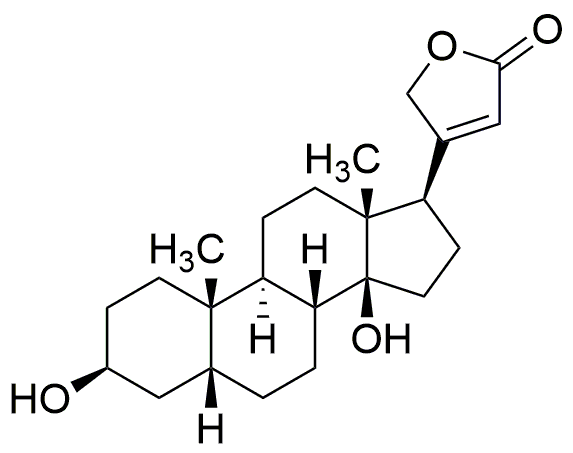Digitoxigenin is widely utilized in research focused on:
- Pharmaceutical Development: This compound is a key precursor in the synthesis of cardiac glycosides, which are used to treat heart conditions such as atrial fibrillation and heart failure.
- Biochemical Research: It serves as a valuable tool in studies investigating the mechanisms of action of steroid hormones and their effects on cellular processes.
- Natural Product Chemistry: Researchers use digitoxigenin to explore the biosynthesis of plant-derived compounds, enhancing our understanding of natural product pathways.
- Toxicology Studies: Its role in evaluating the toxicity of cardiac glycosides helps in assessing safety profiles for new drug formulations.
- Pharmacognosy: This compound is studied for its potential therapeutic effects and benefits in traditional medicine, particularly in herbal remedies.
General Information
Properties
Safety and Regulations
Applications
Digitoxigenin is widely utilized in research focused on:
- Pharmaceutical Development: This compound is a key precursor in the synthesis of cardiac glycosides, which are used to treat heart conditions such as atrial fibrillation and heart failure.
- Biochemical Research: It serves as a valuable tool in studies investigating the mechanisms of action of steroid hormones and their effects on cellular processes.
- Natural Product Chemistry: Researchers use digitoxigenin to explore the biosynthesis of plant-derived compounds, enhancing our understanding of natural product pathways.
- Toxicology Studies: Its role in evaluating the toxicity of cardiac glycosides helps in assessing safety profiles for new drug formulations.
- Pharmacognosy: This compound is studied for its potential therapeutic effects and benefits in traditional medicine, particularly in herbal remedies.
Documents
Safety Data Sheets (SDS)
The SDS provides comprehensive safety information on handling, storage, and disposal of the product.
Product Specification (PS)
The PS provides a comprehensive breakdown of the product’s properties, including chemical composition, physical state, purity, and storage requirements. It also details acceptable quality ranges and the product's intended applications.
Certificates of Analysis (COA)
Search for Certificates of Analysis (COA) by entering the products Lot Number. Lot and Batch Numbers can be found on a product’s label following the words ‘Lot’ or ‘Batch’.
Numéro de catalogue
Numéro de lot/série
Certificates Of Origin (COO)
This COO confirms the country where the product was manufactured, and also details the materials and components used in it and whether it is derived from natural, synthetic, or other specific sources. This certificate may be required for customs, trade, and regulatory compliance.
Numéro de catalogue
Numéro de lot/série
Safety Data Sheets (SDS)
The SDS provides comprehensive safety information on handling, storage, and disposal of the product.
DownloadProduct Specification (PS)
The PS provides a comprehensive breakdown of the product’s properties, including chemical composition, physical state, purity, and storage requirements. It also details acceptable quality ranges and the product's intended applications.
DownloadCertificates of Analysis (COA)
Search for Certificates of Analysis (COA) by entering the products Lot Number. Lot and Batch Numbers can be found on a product’s label following the words ‘Lot’ or ‘Batch’.
Numéro de catalogue
Numéro de lot/série
Certificates Of Origin (COO)
This COO confirms the country where the product was manufactured, and also details the materials and components used in it and whether it is derived from natural, synthetic, or other specific sources. This certificate may be required for customs, trade, and regulatory compliance.


